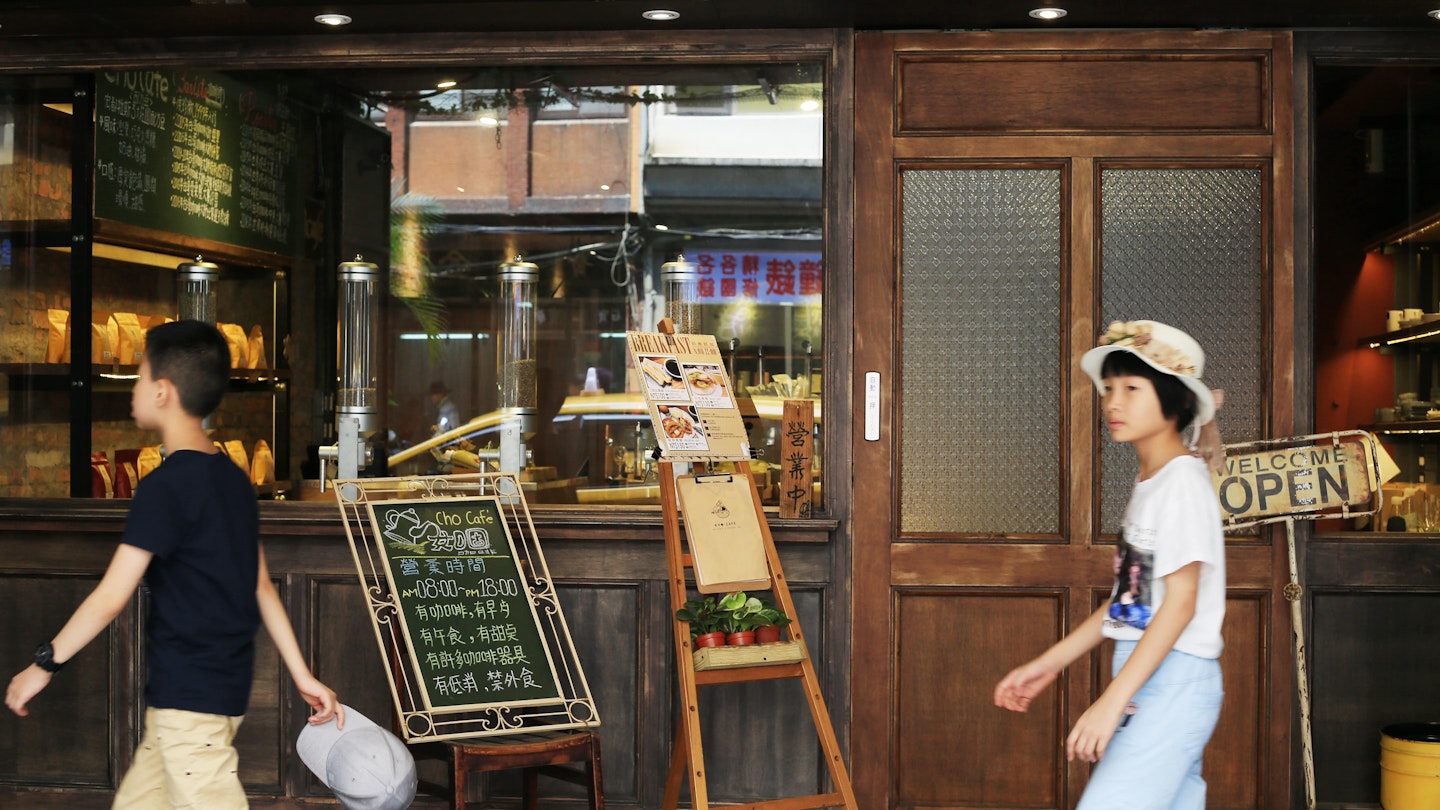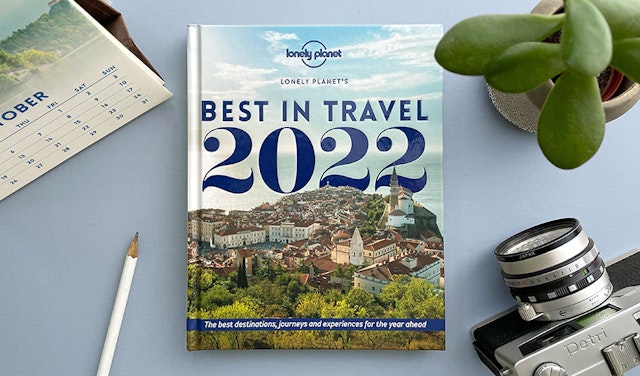Taiwan is a thrilling East Asian destination deserving of your recognition. The capital city of Taipei is where most travelers start their adventure, and, despite being the nation’s most expensive city, Taipei exploration can still be done on thrift. Here’s how:
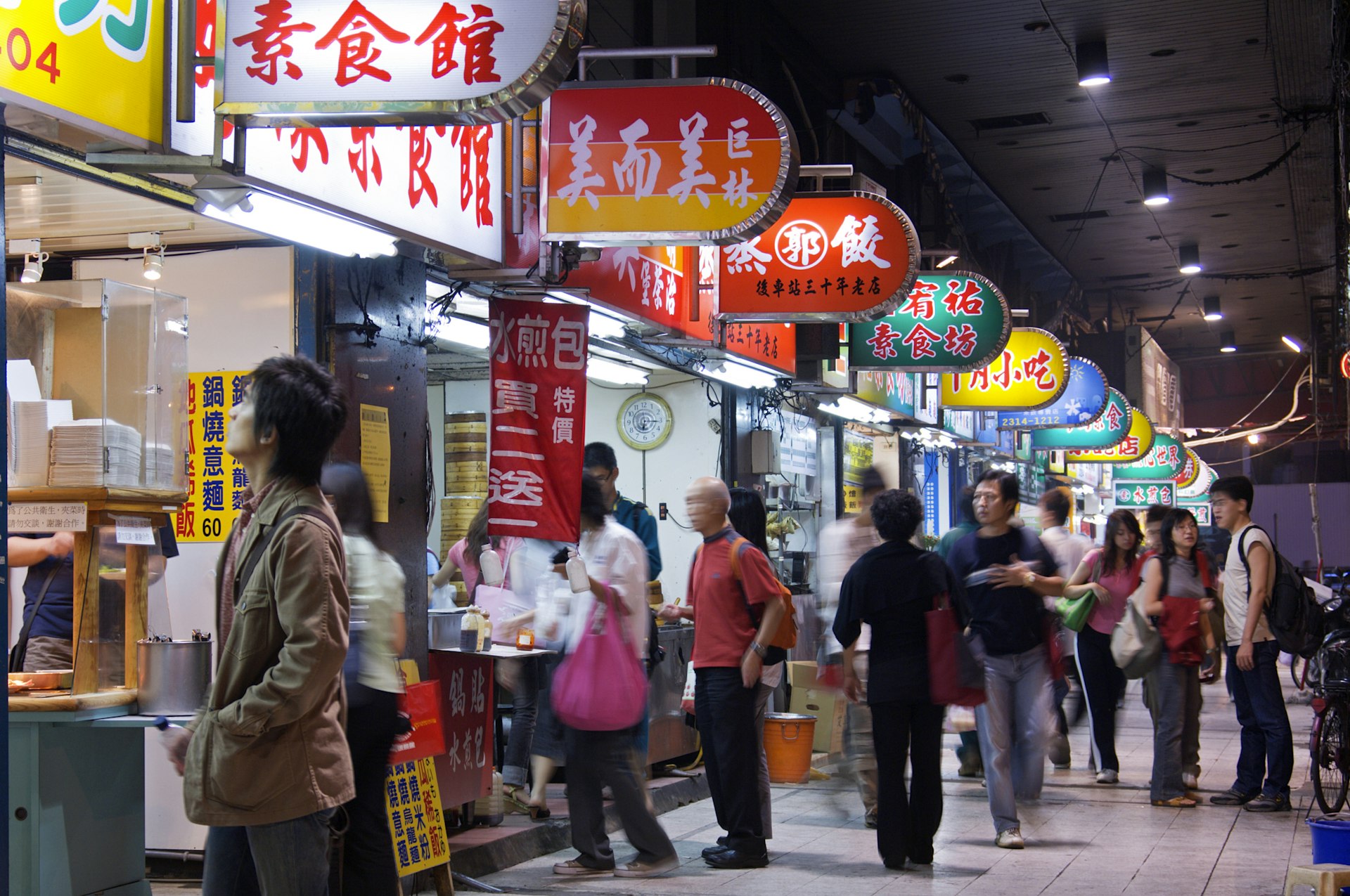
Is Taipei budget friendly?
Absolutely! A number of the best Taipei attractions come free or very cheap, including visits to most museums, temples and parks around the city. The secret of exploring Taipei cheaply is to move through the city like a resident; eating Taiwanese food, mastering public transport and quelling the urge to buy Western brands.
How much money do I need per day in Taipei?
The answer of how much money you need per day in Taipei depends on how easy you find it to integrate! If you’d like to tick off the more touristic attractions – by dining at Din Tai Feng and scaling Taipei 101 – you would have to budget around 2000NTD ($70 USD) per day. Add luxury hotel accommodation to the mix and you could be looking at as much as 5000NTD ($170) per day.
To explore Taipei on a budget however, we recommend sticking to small guesthouses or hostels and dining at local restaurants, moving out into nature when looking for things to do. Travelers willing to stay in low-cost accommodation will find it relatively easy to stick to a more modest 1000NTD ($35) per day, perhaps as little as 600NTD ($20) for the most frugal backpacker lifestyle.
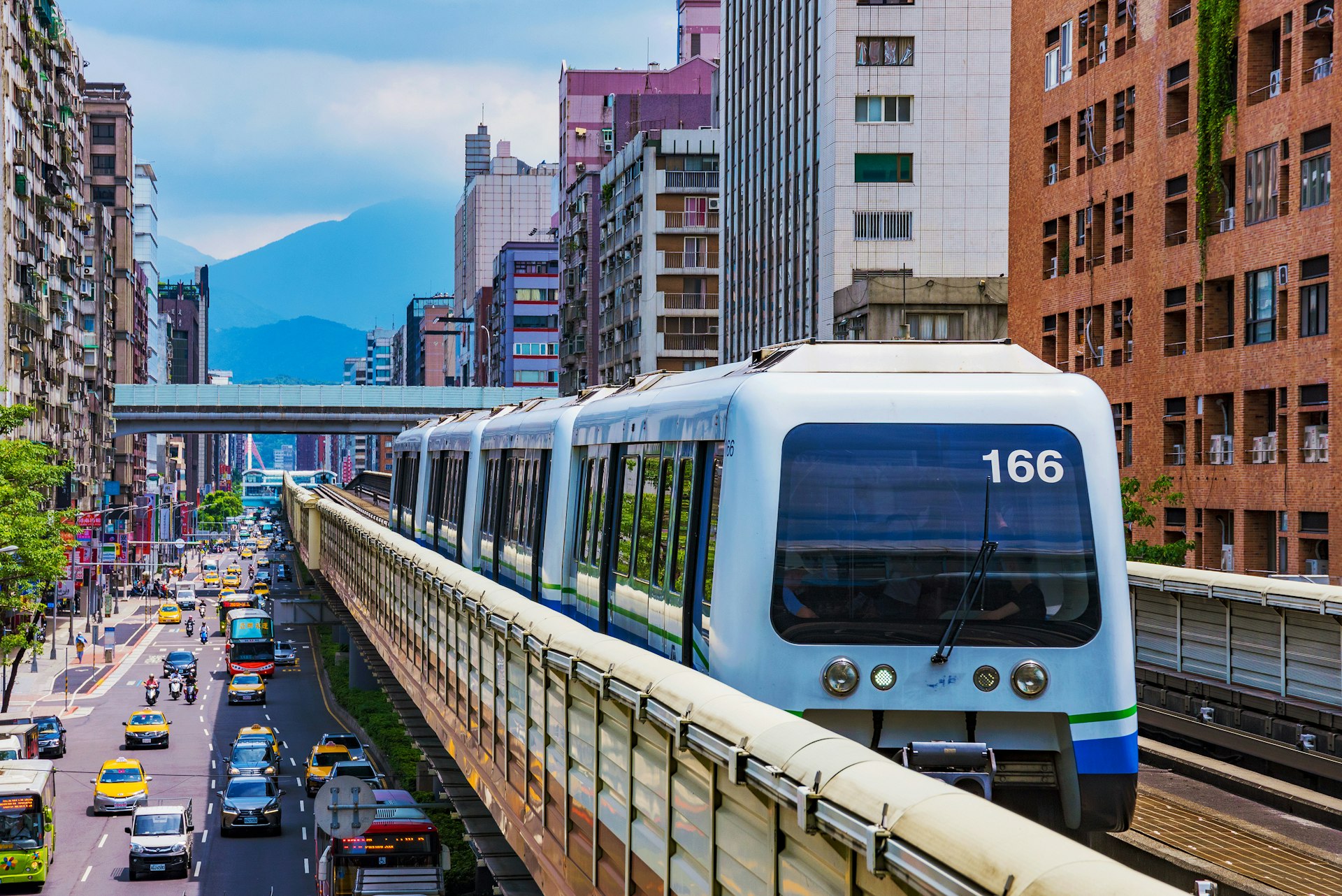
Master the subway system with an EasyCard
One key aspect of Taipei budget travel is to quickly figure out the public transport system. Compared to other metropolitan cities, Taipei’s transport system is very affordable and immaculately clean, with fees of around 20-30NTD ($0.70-1) for a single subway journey (inside an 11-kilometer radius) or 15NT ($0.50) for a single bus fare.
Though there is an option to buy a daily or weekly travel pass, or even an unlimited Fun Pass also cover all the big attractions, the city’s EasyCard metro card is the best way to travel without limits on the subway (MRT), bus, Maokong gondola and YouBike system (at 10-30% less than a single ticket, plus discounts for multiple use). And, if you exceed the cost of a day pass with multiple journeys on your EasyCard, cardholders are reimbursed automatically at the end of the month.
To buy an EasyCard, simply ask at the information booth in any metro station, any 7-11 convenience store or find the automated card machine with the EasyCard logo. The one-off card fee is 100NTD and you can top up any amount.
Hop on a YouBike and cycle the riverside
Taipei City’s YouBike system is free for rides up to 30 minutes and 5NT ($0.17) per half hour thereafter. You’ll often find these bikes left undocked on the street while riders linger over lunch in Daan Forest Park or drinks at Dadaocheng Wharf – they’re that cheap!
In order to use a YouBike, you’ll need to register your EasyCard with a local phone number (easily done on the automated screens beside docking stations) and this is a good reason to pick up a prepaid SIM card at the airport when you arrive.
Nab a data plan on arrival
Contrary to what you might expect, Taiwan’s airports are the cheapest places to buy prepaid SIM cards, making onward connections and Google Search emergencies all the more convenient. Even for a short trip, having data and internet access will allow you to navigate through the city with ease, discovering little-known gems championed on the dustiest corners of the internet.
Of the various companies offering prepaid SIM cards, Chunghwa Telecom, Taiwan Mobile and T-Star all offer good rates (around 300NTD for three days or 500NTD for 10 days) but for extra savings, try booking your SIM in advance on Klook before picking up at Taoyuan Airport. For long-term usage, T-Star is the only provider available for tourists.
Travelers squeezing every penny can alternatively make use of the free 4G service offered in certain areas across the city (such as Ximen and Xinyi districts) and inside most Taipei Metro stations. This service is slightly more inconvenient and less reliable than having your own data plan but, for free and fast 4G, you can’t complain.
Jump on the airport express bus from Taoyuan to Taipei
By all means, get a taxi from Taoyuan International Airport into Taipei City center, but be prepared to pay around 1100NTD ($38) for the privilege. Thankfully there are two convenient and cheap alternatives; the Taoyuan Airport subway line (MRT) and the 1819 Kuo Kuang bus service which both run to Taipei Main Station. Most importantly, you’ll pay a tenth of what you would for a taxi with a slightly longer journey time (just over one hour), costing 160NTD ($5.50) for the MRT and 135NTD ($4.60) for the bus.
Go high-end on the hostel
Hostel living has developed into a bit of an art form in Taiwan, influenced heavily by Japanese minimalism and capsule concepts. As such, budget travelers can consider booking an upscale hostel at relatively low cost, opting for either a dormitory bed or double room.
Despite being your biggest daily expense, dorm beds can allow you to cut costs to around 300-600NTD ($10-20) per night, while double rooms are priced similarly to hotel rooms, between 1000-1500NTD ($35-50). Solo travelers will get better value from dorm offerings, many of which have pod partitions and privacy curtains with clean and modern shared bathrooms.
Explore the night market crowds for cheap street eats
If the Taiwanese are famous for one thing, it is their dedication to late night snacking. Perhaps the best places to find cheap eats in Taipei are the local night markets, dotted around the city in various unassuming spots and operating until 11PM most nights.
Head to Songshan’s Raohe Night Market or otherwise search online for your nearest ‘夜市’ and join the streams of locals to snack on skewers of various meats – barbequed, roasted and braised – giving the fermented delicacy of stinky tofu a fair review while you’re at it. You can wash it down with an inordinate variety of teas and tofu puddings, jazzed up with aloe vera, tapioca and brown sugar toppings.
Get your fill of fresh produce
Granted, eating out in Taiwan is never going to break the bank and most accommodations don’t have kitchen facilities, but preparing yourself a spread of Taiwan tropical fruits is the very least you can do for your taste buds.
Even in the capital, you’re never far from farmland in Taiwan, meaning that domestic fruit and veg are both flavorful and cheap. Eat local and in season for the lowest prices, sampling locally grown mango, watermelon and pineapple in summer (arguably the juiciest in the world), wax apple and custard apple (AKA Buddha’s head) in spring, and dragonfruit in fall.
Get busy on weekdays
There are a great many attractions in and outside Taipei worthy of your time, and weekday trips to the best sites can sometimes be cheaper, for example discounted rides on the Maokong Gondola and ice skating at Taipei Arena.By traveling on a weekday, you’ll also be avoiding the weekend crowds enjoying day trips near Taipei, maybe even nabbing a good seat on popular public services such as Pingxi Old Railway, Maokong gondola and trains running towards Keelung, Fulong Beach and Jiufen village.
Get savvy with museum admissions
Doing your research before heading out could help save a day’s budget and stop you making the mistake of arriving on a Monday (they’re all closed!). The Taipei Fine Arts Museum offers free entry on Saturday evenings and the National Palace Museum opens its doors for free on several special holidays (including New Year’s Day and National Day on October 10). You can also combine your ticket purchases on top Taipei attractions to save money, adding on the Miramar Ferris Wheel or Taipei 101 to your National Palace Museum ticket (350NTD for regular admission to the museum plus 50NTD for the Ferris Wheel or 470NTD for Taipei 101).
Avoid 101 and scale Elephant Mountain instead
The trouble with the view from Taipei 101 Observatory is that there’s no view of Taipei 101, the city’s most iconic building! For this disappointing discovery, you’ll have to fork out 600NTD ($20). Savvy travelers will instead find the tallest structure nearby and scale that instead for better (and cheaper) views of the Taipei skyline.
My recommendation is the Elephant Mountain trailhead instead. Just a 20-minute walk from Taipei 101 or five minutes from Xiangshan MRT station, it leads visitors up a steep jungle track towards an exceptional cityscape with 101 in the center, framed by forest and mountains. Free for all, this hiking trail is one of the city’s most popular, though foot traffic remains low outside of peak sunset-watching hours.
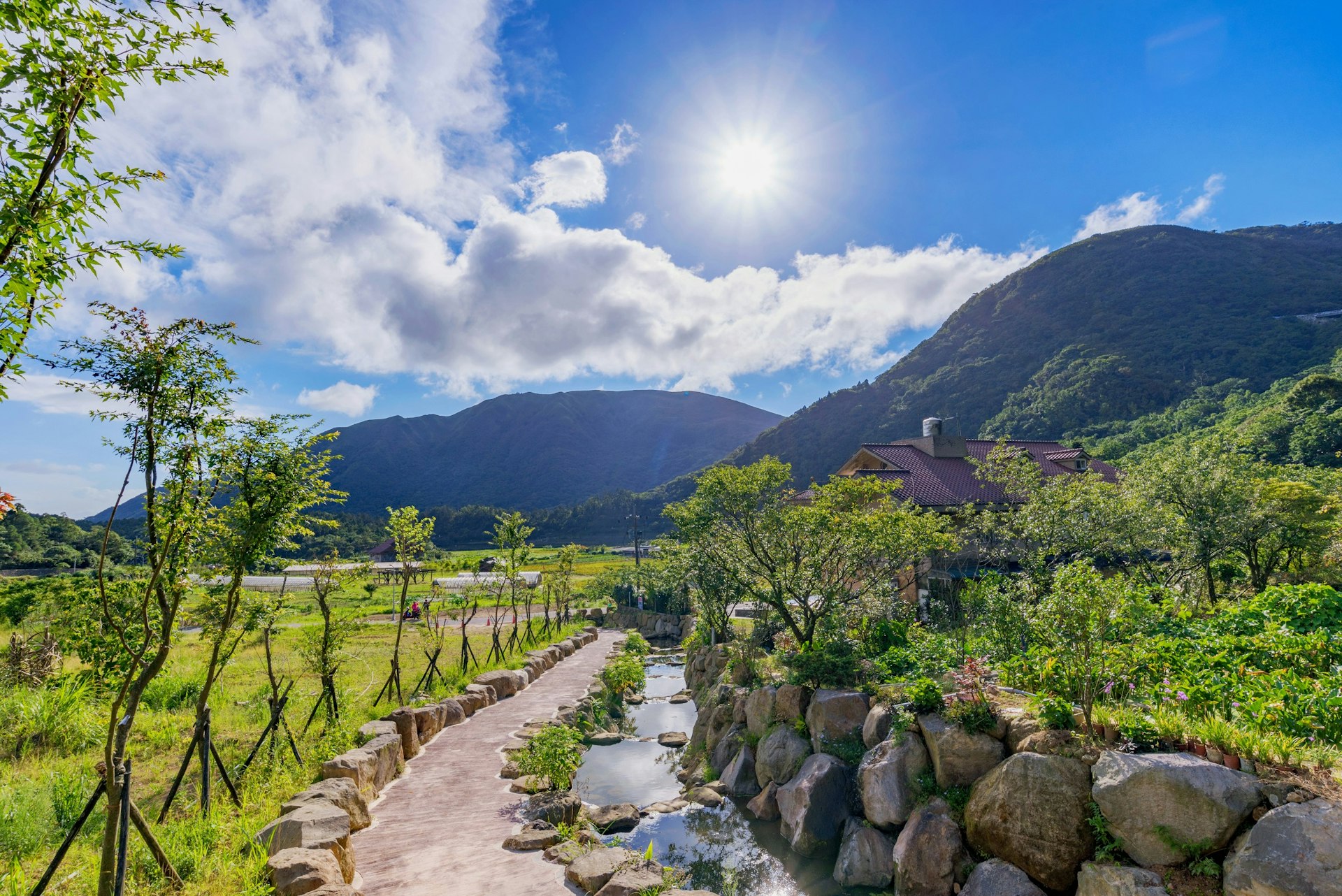
Ditch the mall and head straight to Yangmingshan
The icy allure of AC may tempt you to hide in a department store to avoid the sweltering afternoon heat (especially from May to August), but to truly appreciate the free wonders of Taipei, you’ll need to sweat for them.
Don your most sweat-absorbent clothing and set out in the early morning or late afternoon to visit Yangmingshan, a verdant mountain range that dominates the area just north of Taipei City, with ten hikeable peaks to choose from. You can arrive at a trailhead within 50 minutes by bus from central Taipei, immersing yourself in nature on trails of varying difficulty (all for free).
All of the major peaks can be done in one (long) day of hiking for those with some experience. But if you don’t have ten hours to spare, consider hitting one or two of the peaks, via the Mt. Datun trailhead (to conquer the main, south and west Datun peaks) or the Erziping trailhead. If volcanic activity is your thing, head to Xiaoyoukeng for fumaroles and sulfur crystals (taking the S15 bus to Lengshuikeng from Jiantan or Shilin MRT station) before hiking to Qingtiangan Grasslands to help clear the eggy smell from your nose.
Fly to Taipei in winter
A solid piece of advice for any traveler is to fly to Taipei in winter (or during the short-lived autumn), from November to March. By doing so, you can swerve the typhoons and heavy rains that descend on the island throughout summer, also avoiding the extreme heat from May to August (regularly exceeding 35°C). And, as a bonus, you’ll save money!
The last thing you want is to break your budget by hailing a taxi on a humidity-induced whim, so traveling in the cooler months certainly helps cut costs. Walking and cycling become more amenable in winter, allowing cheap travel throughout the city and long, meandering rides along the city’s riverside bikeway without breaking into too much of a sweat.
As well as winter savings, budget travelers may consider the shoulder seasons of September and October and April and May to save money on flights and accommodation. Times you’ll want to avoid include Chinese New Year (early February) when everything in Taipei shuts down for several days and travel options outside the city skyrocket in price and inconvenience. August and December also see a rise in flight fares due to extra demand during school holidays.
Travel during Ghost Month
‘Ghost Month’ is a traditional Taoist festival running for one month on the Chinese calendar (around August). At this time, it is said the gates of the underworld open and spirits are released to roam around and visit loved ones. Though the spirits are not considered malicious, many locals avoid certain activities that may be inauspicious. Of these activities, travel is a big no-no, as is swimming in the sea or whistling at night.
Fearless and budget-conscious travelers can pay attention to when this festival starts in order to take advantage of lower accommodation fees in popular destinations near Taipei such as Jiufen, Jiaoxi and Wulai village.
Bathe with locals at Beitou Public Hot Springs
For the few weeks of the year when Taipei is cool enough to warrant a steaming bath, you may like to try a hot spring visit. Up in Beitou, you’ll find a range of hot springs resorts fed by mineral springs from Beitou’s Thermal Valley on the northern cusp of the city center (accessible by subway just 30 minutes from Taipei Main Station).
While you can certainly splash out on an upscale hotel to rival that of Japan’s best onsen towns at half the price, travelers on a smaller budget who don’t mind cleansing their pores alongside Taipei’s community of old folk, can pay the 40NTD ($1.40) entrance fee to bathe at Beitou Public Hot Springs, arguably where the real party’s at.
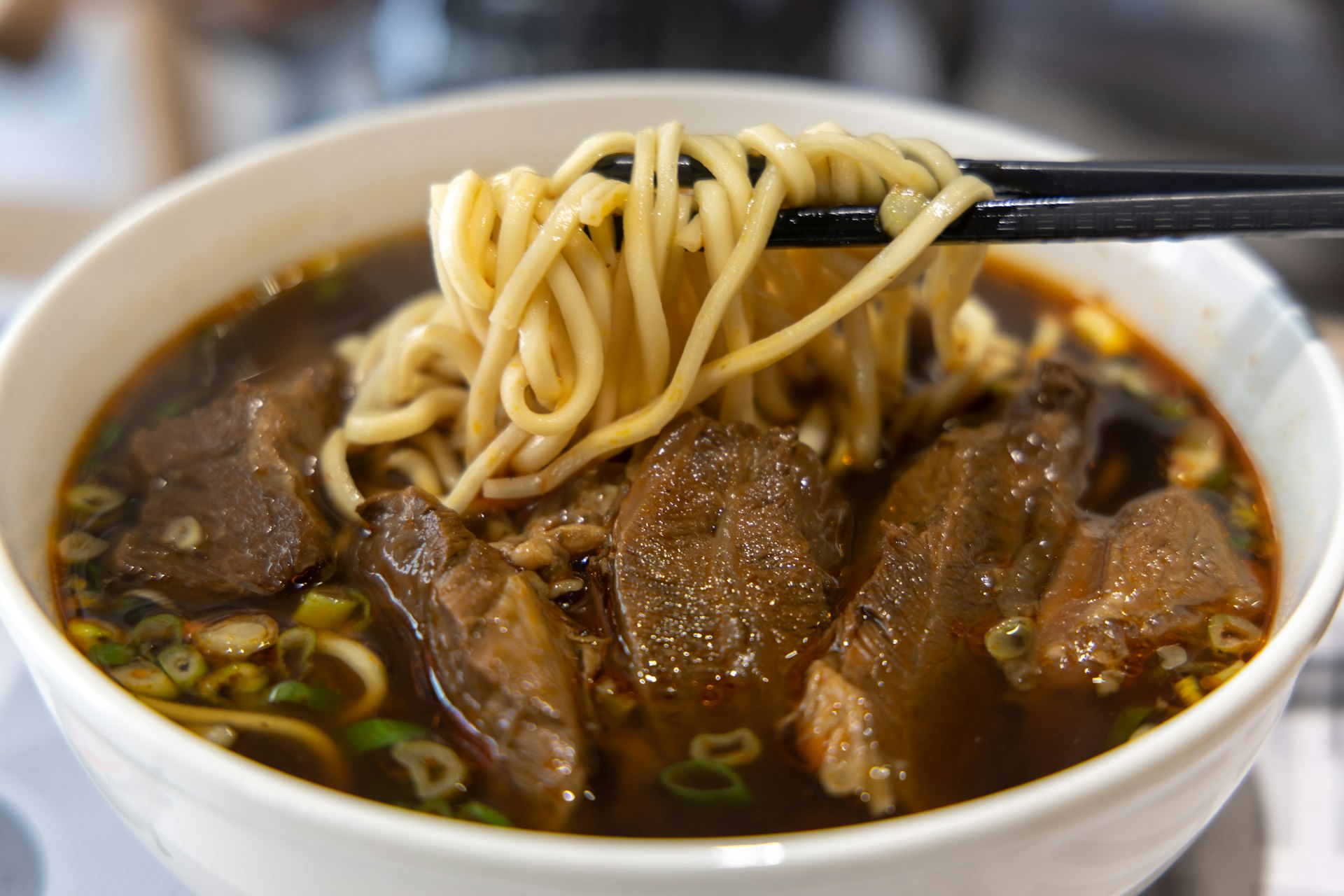
Eat noodles, not pasta
Avoiding Western food while in Taipei will not only save you a good deal of cash, but it will also help bring you closer to authentic Taiwanese food culture. Even if there are no pictures to help you decipher a hand-scrawled menu in Chinese characters, don’t let that stop you from dining at a restaurant. As a workaround, you can point to dishes of photos from reviewers on Google Maps or take a chance on the owner’s English skills (the younger they are, the more likely they’ll understand you).
A slightly more time-consuming method (but definitely the best way to score points with the locals) would be to learn Mandarin phrases for top Taiwanese dishes and numbers and then recite them when in search of food. For example, ‘yi wan’ meaning ‘one bowl’ and ‘neo row me-en’ meaning ‘beef noodle’. The vendors will at least pretend to be super impressed!
Consider exploring more of East Asia
Once in Asia, regional travel becomes a whole lot more affordable. Onward flights to the Philippines, Japan, South Korea and Indonesia are all offered by local budget airlines such as Scoot, Tiger Airways, JetStar Asia and Peach, with the best prices on weekdays outside of holiday seasons.
Take the slow train on day trips from Taipei
You might like the idea of whizzing down the length of the country in the time it takes to watch an Ang Lee movie, but traveling on the nation’s high-speed rail system (HSR) – modeled on the Japanese Shinkansen – is not the most affordable way to travel Taiwan. The cost of traveling 300 kilometers per hour from Taipei to Kaohsiung (Zuoying station) is 1490NTD ($50), though tickets with non-reserved seats do come slightly cheaper.
If time is on your side, consider taking a regular train to closer afield destinations such as Yilan or Hualien. This way you’ll save wildly, even on express train bookings. Prices to Yilan on the Taiwan Railway rarely exceed 200NT ($7) at less than two hours, while Hualien’s Taroko Gorge becomes accessible within three hours at 400NT ($14).
Daily costs
Hostel room (dorm): 300-600 NTD ($10-20 USD)
Basic room for two: 700-1000 NTD ($25-35)
Nice room for two: 1000-1500NTD ($35-50).
Self-catering apartment (including Airbnb): 1500-2000
NTD ($50-70)
Public transport ticket: 25 NTD ($0.85)
Coffee: 100-150 NTD ($3.5-5)
Bubble tea: 50 NTD ($1.70)
Night market meal for two: 200 NTD ($7)
Restaurant meal for two: 600 NTD ($20)
You might also like:
“Your chi door is not open”: experiencing a traditional knife massage in Taipei
The best national parks in Taiwan
Sunrise over Jade Mountain: a trip up Taiwan’s Alishan Forest Railway

